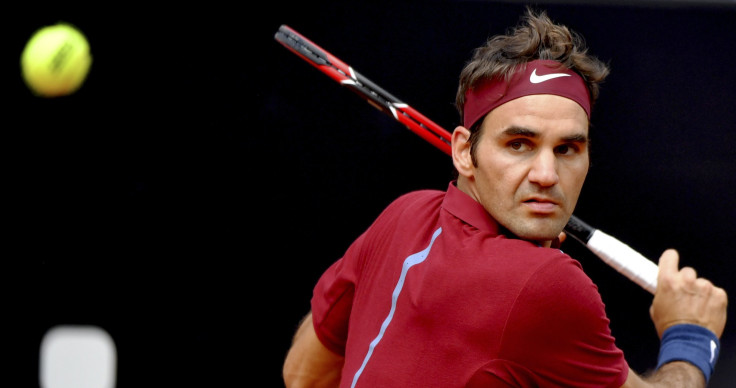Roger Federer French Open 2016: Swiss Legend Faces Questions Ahead Of Grand Slam

After a freak knee injury away from the court and a prolonged absence, world No. 3 Roger Federer has his work cut out for him against tennis superstars Novak Djokovic, Andy Murray, Rafael Nadal, and not to mention fellow countryman and defending champion Stan Wawrinka, in next week's French Open.
Following left knee surgery in February, the 34-year-old, 17-time Grand Slam champion returned to the court in April and reached the Monte Carlo Masters 1000 quarters and followed it up with a Round-of-16 exit in Rome two weeks ago. The two results seem to serve as potential warning signs that Federer may not be ready to tackle the beckoning Grand Slam.
Federer told reporters in March that he injured his knee while drawing a bath for his twin daughters, or rather simply turning around and hearing a click in his knee. Subsequent swelling led to arthroscopic surgery to repair torn cartilage and Federer either skipping a tournament, or participating and then falling to an opponent ranked inside the top 15.
"It was a very simple movement, probably a movement I've done a million times in my life," Federer told reporters in March. "I didn't think much of it when it did happen."
In Monte Carlo, where Federer had reached four finals but never won due to Nadal's dominance, he dispatched early round opponents in his trademark style. Between No. 38 Guillermo Garcia-Lopez and No. 17 Roberto Bautista Agut, Federer won at least 74 percent of his first-serve points and 70 percent of his return points for clean sweeps in both matches.
However, in the next round against No. 9 Jo-Wilfried Tsonga, Federer won the first set, labored in the last two, and fired off only one ace compared to the Frenchman’s eight, and his first serve return rate plummeted to 27 percent.
Then in Rome, Federer cleaned out 19-year-old Russian Alexander Zverev 6-3 7-5, but ran out of steam against No. 15 Dominic Thiem, failing to win the first-set tiebreaker and dropping the last set 6-4. The loss was a mere three months removed from Federer’s 6-1 6-4 victory over Thiem in Brisbane.
A month before the surgery, Federer was still playing like and beating the world’s top players. He toppled No. 6 Tomas Berdych in the Australian Open quarterfinals and pushed Djokovic, the eventual tournament winner, to four sets in the semis.
Based off his stellar 63-11 record and six singles titles secured last year, Federer’s maintained his No. 3 ranking but his months-long absence and early exits will start to add up unless he makes a strong showing at Roland Garros. Thus far, the Swiss star has posted an 11-4 record over four tournaments this season and has yet to hoist a single trophy.
Building back up to the French without much work on red clay prior to the tournament has clearly proven difficult for Federer. He owns three victories on the surface in five matches over two tournaments this year, but in 2015, when he reached the French quarters, Federer appeared in four clay tournaments and nearly won the Italian Open.
Federer walked away with the clay title in Istanbul, slipped up in Madrid’s second round, but rallied for a deep run in Rome to create some momentum before the trip to Paris. There was optimism that Federer's showing in Italy was an indicator that he could break aGrand Slam drought that dates back to the 2012 Wimbledon. He had ousted Berdych in the quarters and then-No. 9 Stan Wawrinka in the semis before Djokovic struck him down in the final.
Federer has often defied his age, finding a way to outlast elite opponents in their prime. When he first entered the top 100 in 1999, few could have imagined he would be No. 3 in the world in 2016. Indeed, understimating the mild-mannered legend has proven to be a futile effort.
But the lack of recent success on clay and questions about his fitness may mean a deep run at the French isn't in the cards. There is even some doubt as to whether Federer will even compete at Roland Garros at all.
"Now obviously time starts ticking more towards Paris," Federer said last week. "The next 10, 12 days are going to be really important for me to recover. Then, I'll make a plan, I guess today, what the recovery and practice plan is going to be.
"Clearly the way I'm playing right now is never going to be enough for any good run in Paris, and then I also wouldn't play this way. I'm still confident I will be fine somehow."
© Copyright IBTimes 2024. All rights reserved.





















